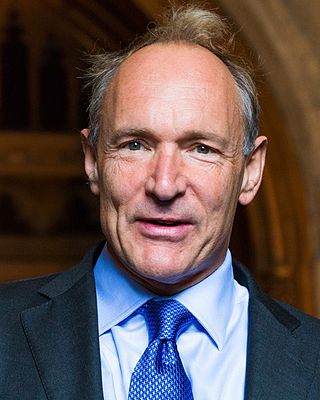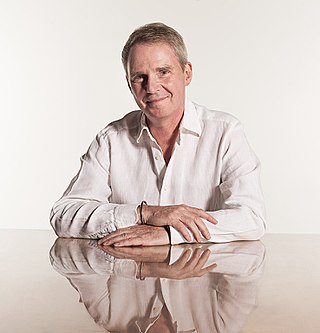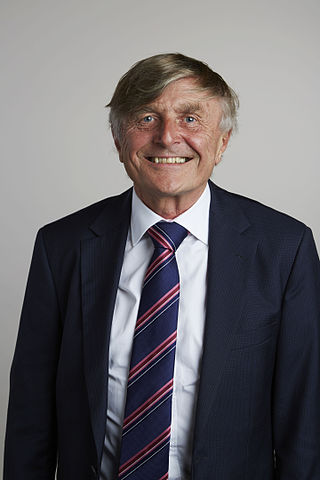Related Research Articles

Kevin Warwick is an English engineer and Deputy Vice-Chancellor (Research) at Coventry University. He is known for his studies on direct interfaces between computer systems and the human nervous system, and has also done research concerning robotics.
The Semantic Web, sometimes known as Web 3.0, is an extension of the World Wide Web through standards set by the World Wide Web Consortium (W3C). The goal of the Semantic Web is to make Internet data machine-readable.

Sir Timothy John Berners-Lee,, also known as TimBL, is an English computer scientist best known as the inventor of the World Wide Web. He is a professorial research fellow at the University of Oxford and a professor emeritus at the Massachusetts Institute of Technology (MIT). Berners-Lee proposed an information management system on 12 March 1989, then implemented the first successful communication between a Hypertext Transfer Protocol (HTTP) client and server via the Internet in mid-November.

The Institution of Engineering and Technology (IET) is a multidisciplinary professional engineering institution. The IET was formed in 2006 from two separate institutions: the Institution of Electrical Engineers (IEE), dating back to 1871, and the Institution of Incorporated Engineers (IIE) dating back to 1884. Its worldwide membership is currently in excess of 158,000 in 153 countries. The IET's main offices are in Savoy Place in London, England, and at Michael Faraday House in Stevenage, England.
John Maurice McClean Pinkerton was a pioneering British computer designer. Along with David Caminer, he designed England's first business computer, the LEO computer, produced by J. Lyons and Co in 1951.

Willy Susilo is an Australian cybersecurity scientist and cryptographer. He is a Distinguished Professor at the School of Computing and Information Technology, Faculty of Engineering and Information Sciences University of Wollongong, Australia.

In computing, linked data is structured data which is interlinked with other data so it becomes more useful through semantic queries. It builds upon standard Web technologies such as HTTP, RDF and URIs, but rather than using them to serve web pages only for human readers, it extends them to share information in a way that can be read automatically by computers. Part of the vision of linked data is for the Internet to become a global database.

The Turing Talk, previously known as the Turing Lecture, is an annual award lecture delivered by a noted speaker on the subject of Computer Science. Sponsored and co-hosted by the Institution of Engineering and Technology (IET) and the British Computer Society, the talk has been delivered at different locations in the United Kingdom annually since 1999. Venues for the talk have included Savoy Place, the Royal Institution in London, Cardiff University, The University of Manchester, Belfast City Hall and the University of Glasgow. The main talk is preluded with an insight speaker, who performs an opening act to the main event.

MCKVIE is an engineering college founded in 1999, affiliated to West Bengal University of Technology. It ranks as one of the top engineering colleges in West Bengal and graded AA+ by Careers 360 (magazine) in 2015. The institute offers bachelor's and master's degrees in various engineering streams as well as a master's degree in computer applications. Students are admitted through West Bengal Joint Entrance Examination WBJEE, Joint Entrance Examination and Graduate Aptitude Test in Engineering. It has been selected for a TEQIP grant by the World Bank and also accredited by National Board of Accreditation. Also accredited by NAAC 'A' grade. The institute is located in Liluah, Howrah, West Bengal, India.
Robert S. H. Istepanian is a visiting professor at the Faculty of Medicine, Institute of Global Health Innovation, Imperial College, London. Istepanian is widely recognized as the first scientist to coin the phrase m-Health. In 2012, Istepanian coined the new term 4G Health which is defined as "The evolution of m-health towards targeted personalized medical systems with adaptable functionalities and compatibility with the future 4G networks."

Sir Nigel Richard Shadbolt is Principal of Jesus College, Oxford, and Professorial Research Fellow in the Department of Computer Science, University of Oxford. He is Chairman of the Open Data Institute which he co-founded with Tim Berners-Lee. He is also a Visiting Professor in the School of Electronics and Computer Science at the University of Southampton. Shadbolt is an interdisciplinary researcher, policy expert and commentator. His research focuses on understanding how intelligent behaviour is embodied and emerges in humans, machines and, most recently, on the Web, and has made contributions to the fields of Psychology, Cognitive science, Computational neuroscience, Artificial Intelligence (AI), Computer science and the emerging field of Web science.
David Caminer OBE was a British computer engineer who helped to develop the world's first business computer, LEO. He has been called "the world's first corporate electronic systems analyst" and "the world's first software engineer". He carried out the systems analysis and charting for the world's first routine business computer job, thus he is also called "the first business application programmer".
The IET Mountbatten Medal is awarded annually for an outstanding contribution, or contributions over a period, to the promotion of electronics or information technology and their application. The Medal was established by the National Electronics Council in 1992 and named after Louis Mountbatten, The Earl Mountbatten of Burma, Admiral of the Fleet and Governor-General of India. Since 2011, the medal has been awarded as one of the IET Achievement Medals.

Sir Robin Keith Saxby FREng HonFRS is an English engineer who was chief executive and then chairman of ARM Holdings, which he built to become a dominant supplier of embedded systems.
David F. Welch, Ph.D, is an American businessman and research scientist. Welch is a pioneer in the field of optical devices and optical transport systems for telecommunications networks. Welch first made it possible to commercially deploy reliable 980 nm laser pumps, needed in low noise optical amplifiers employed in dense wavelength division multiplexing (DWDM) telecommunications systems. He also achieved the first commercial optoelectronics integrated circuit, several years ahead of any competing research or developments laboratory.
Josef KittlerFREng is a British scientist and Distinguished Professor at University of Surrey, specialising in pattern recognition and machine intelligence.
The IET A F Harvey Engineering Research Prize is a global engineering research prize awarded annually to an innovative researcher by the Institution of Engineering and Technology. It was named after an engineer, Arthur Frank Harvey.

Peggy Lilian Hodges was a British engineer who worked on guided missile technology at GEC Marconi.

The Young Woman Engineer of the Year Awards are presented at the Institution of Engineering and Technology, London, England. Part of the IET Achievement Medals collection, the award was launched in 1978, and was originally known as the Girl Technician of the Year, until renamed in 1988. The award was first sponsored by the Caroline Haslett Memorial Trust, which was formed in 1945. It is now funded and sponsored by the Institution of Engineering and Technology and Women's Engineering Society. Awarded to young female engineering apprentices in the UK.
References
- ↑ is2.lse.ac.uk/leo/archive/caminer2.pdf[ dead link ]
- ↑ "IEEE Xplore - Calendar". Ieeexplore.ieee.org. 2011-09-27. Retrieved 2012-09-14.
- ↑ "Pinkerton Lecture 2006". Tv.theiet.org. 2006-06-13. Retrieved 2012-09-14.
- ↑ "Talks by Tim Berners-Lee". W3.org. Retrieved 2012-09-14.
- ↑ Alex Balfour. "Social Media and the Olympics: Change, Social Media and London 2012". Slideshare.net. Retrieved 2012-09-14.
- ↑ "IT - is it on the money? - John Carey - 2009 Pinkerton Lecture". Tv.theiet.org. 2009-11-25. Retrieved 2012-09-14.
- ↑ "The Pinkerton Lecture:The relentless march of the microchip". Tv.thiet.org. Archived from the original on 28 August 2011.
- ↑ "The Pinkerton lecture - IET Conferences". Conferences.theiet.org. Retrieved 2012-09-14.
- ↑ "The Pinkerton lecture - IET Conferences". Theiet.org. Archived from the original on January 13, 2013. Retrieved 2012-09-14.
- ↑ "The IET Pinkerton Lecture 2013". www.theiet.in. Archived from the original on 4 November 2013. Retrieved 22 May 2022.
- ↑ "The IET Pinkerton Lecture 2014". events.theiet.in. Archived from the original on 8 November 2014. Retrieved 22 May 2022.
- ↑ "The IET Pinkerton Lecture 2015". events.theiet.in. Archived from the original on 22 November 2015. Retrieved 22 May 2022.